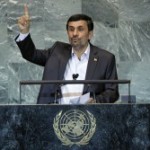The recent acts of global terrorism on the part of Iran against Israeli targets are efforts at gaining revenge and building deterrence by Tehran in their ‘Cold War’ against the West, according to a regional expert. Dr. Jonathan Spyer told The Mideast Update by phone he feels the conflict is rising in intensity, particularly after the assassinations of Iranian nuclear scientists—to which the latest acts of terror are a sort of response by Iran.
“The Iranians clearly believe that Israel is responsible for the killings of a number of Iranians associated with the nuclear program in recent months and weeks in Iran itself,” said Spyer. “So as far as they are concerned they are now clearly mobilizing some of their own assets and resources across the world to try to hit back, as they see it, and to strike at Israeli and Jewish targets” as both revenge and seeking deterrence.
Spyer, a senior research fellow at the Global Research in International Affairs (GLORIA) Center at IDC-Herziliya in Israel, said he feels things may calm down “for a while,” but they aren’t over.
“What we can predict is that this is a struggle which is by no means done. Whether we get to hear about every incident or not, I would say it’s inevitable that there will be further acts in this war,” said Spyer.
He noted that Iran has a “long history of paramilitary and terrorist activities” in third-party countries. Some noteworthy examples include terrorist bombings on Jewish and Israeli targets in Argentina in the early 1990s. Spyer said that regarding the latest attacks, “none of the details ought to surprise anybody who’s watching Middle East processes carefully.”
In analyzing the bombings in Asia and Georgia, and the foiled attempt last year against the Saudi ambassador to the US, Spyer said the Iranian mistakes and a “certain sense of amateurishness” aren’t new either. “This is something which has characterized certain Iranian and Hezbollah international operations in the past—not always, but sometimes.” He said that this time the Iranians do have a sense of urgency and perhaps tried to act too quickly.
As for the Israeli response to the terrorism, Spyer felt they would try to “beef up security” at facilities abroad, as well as taking defensive measures. At the same time, Israel has extensive covert operations capabilities.
Assuming it is in fact Israel—and not one of Iran’s many other enemies—that has been sabotaging Iran’s nuclear program, Spyer said one can expect that to continue, but on their terms. “I don’t think Israel will want necessarily to react immediately, tactically to every act by the Iranians; Israel prefers, I think, to set the agenda in this struggle.”
Overall, Spyer compared this ‘Cold War’ between Iran and the West to the previous cool conflict between the US and the Soviets. He noted that the Iran-West struggle has multiple layers: diplomacy and sanctions, conventional warfare in the Israel-Lebanon and Gaza conflicts and an ongoing “secret war.”
The Iranians are using all of these levels to try and buy time as they progress with their illicit nuclear program. Their recent activities, ranging from terrorism and refusing to cooperate with the United Nations’ nuclear watchdog agency to trying to re-engage the West in negotiations, can make Tehran appear schizophrenic. Spyer says they’re not.
“I think they’ve been doing these kind of joint-activities for years now. The sense in which on the one hand Iran is entirely recalcitrant and secretive… and at the same time Iran claims to be willing to negotiate, claims to want to get back to talking and so on, in order to buy time,” said Spyer. “This has been the modus operandi of the Iranians really ever since the nuclear program was first revealed back in 2002-2003. I think it’s worked fairly well for them, because the Iranians are aware that there is a desperate desire on the part of the West to avoid the necessity of confrontation.”
Despite the heating up of the ‘Cold War’ between Iran and the West, Spyer said the fight hasn’t reached the finale yet.
“I don’t think we are necessarily close to the end game. I think things are intensifying because the Iranians, of course, are moving closer, although they are still some way away, we are told, from a nuclear weapons capacity,” said Spyer. “I think that there is a rising intensity. I think the killings of Iranian nuclear scientists galvanized the Iranians into wanting to act.
“…This war, in a certain sense, may even only just be getting going. It’s certainly nowhere near its end. It certainly may well not yet have reached its height.”
(By Joshua Spurlock, www.themideastupdate.com, February 22, 2012)

